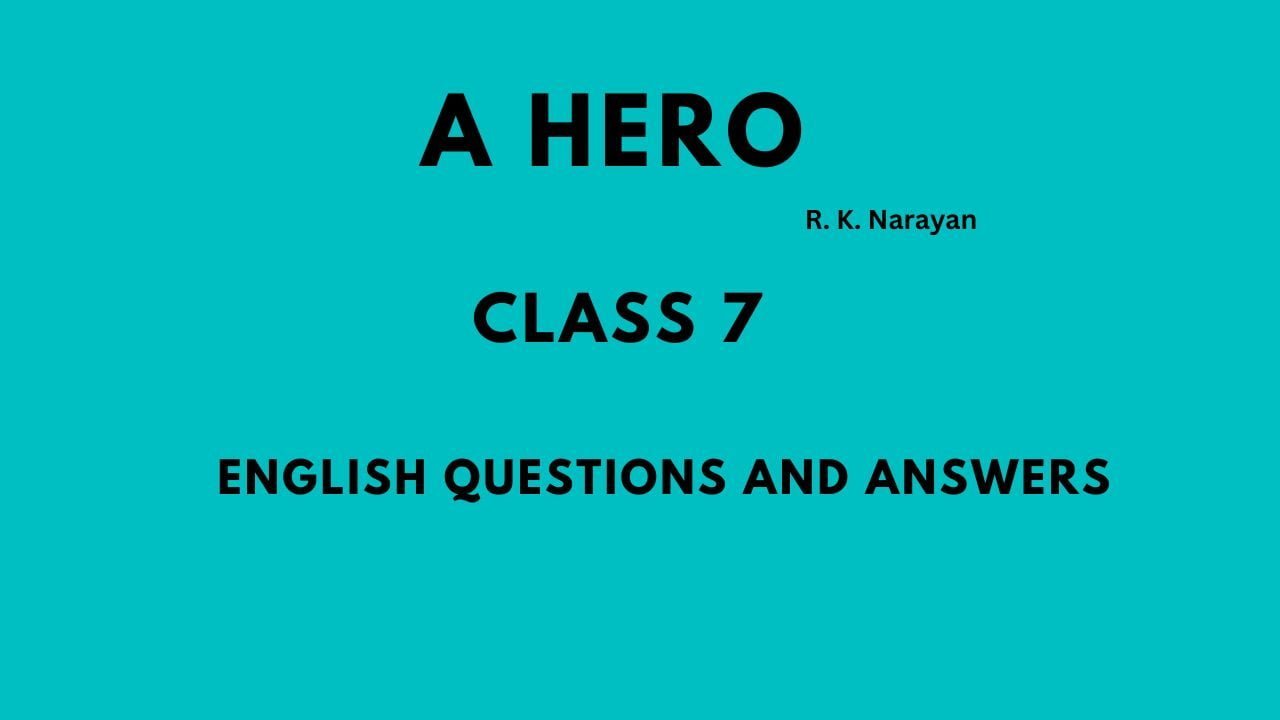Questions and Answers A Hero by R. K. Narayan explores the journey of Swami, a young boy navigating school life and his encounters with an unexpected hero. Set in colonial India, the story captures Swami’s curiosity and admiration for a local wrestler, unraveling themes of heroism and identity.
Questions and Answers A Hero: Pre-reading Task
1. Work in groups of four or five and list the qualities that make a person a hero.
Ans:
- Bravery
- Selflessness
- Determination
- Honesty
- Compassion
- Leadership
- Resilience
- Integrity
2. ‘Courage is an attitude. It is there in the mind. Do you agree? Discuss with reasons.
Ans: Yes, I agree. Courage is an attitude because it involves facing fears and challenges with a positive mindset. It is about mental strength and the willingness to act despite fear. For example, people can be physically weak but still show great courage by standing up for what is right or helping others in need. Courage comes from a strong belief in oneself and the values one holds, making it a mental and emotional quality rather than a physical one.
I Understanding the Story of A Hero Questions and Answers
A. Each statement given below contains one wrong word/phrase, which makes the complete statement false. Underline the wrong words/phrases and replace them with the correct ones to make the statements true. One has been done for you.
1. Swami’s father read the report of a lad’s bravery in a weekly magazine.
- weekly -> newspaper
2. The boy was rescued by some people who captured the tiger.
- captured -> killed
3. Swami seemed convinced of the boy’s bravery.
- convinced -> doubtful
4. Swami had always slept beside his mother.
- mother -> grandmother
5. Swami proposed to sleep alone beginning with the same night.
- proposed -> was forced
6. Swami studied in fourth grade.
- fourth -> sixth
7. Swami had to sleep alone in the hall.
- hall -> office room
B. Answer the following questions briefly in about 30 words.
1. How did Swami react to the news of the village lad’s bravery? How was his reaction different from his father’s reaction?
Ans: Swami doubted the story and was scared. His father was impressed and believed it.
2. What was the challenge given to Swami by his father? How did he receive it?
Ans: Swami’s father challenged him to sleep alone in the office room. Swami was frightened and reluctant.
3. Describe Swami’s feelings in the office room at night.
Ans: Swami felt scared and nervous in the dark, silent office room.
4. How did Swami catch the burglar?
Ans: Swami accidentally caught the burglar by grabbing his leg while hiding under the bench.
C. Of the following words, which would you choose to describe Swami and why?
1. meek
2. clever
3. cowardly
4. courageous
5. boastful
6. strong
Ans: I would choose cowardly to describe Swami because he was very scared of sleeping alone in the office room and doubted the bravery of the village lad who faced the tiger.
D. Various incidents in the story evoke contradictory reactions from Swami and his father. Complete the table given below highlighting the difference of opinion between the two.
| Father thought | Swami thought |
| (a) The village boy who had fought atiger was very courageous. | |
| (b) | Courage alone cannot do anything, strength is also important. |
| (c) Sleeping alone would make Swamicourageous and independent. |
II HOTS
Courage is everything, strength and age are not important. Do you agree? Why/Why not?
Ans: I agree. Courage is about facing fears and taking action despite being scared. It’s not about physical strength or age. Even young or physically weak people can be brave and do remarkable things by showing courage.
III Life Skills
A. Would you call Swami ‘a hero’? Why/Why not?
Ans: Yes, I would call Swami a hero because he showed courage by facing his fear and accidentally catching the burglar, even though he was very scared.
B. Should children be allowed to face nasty situations in life or should they be always kept protected?
Ans: Children should be allowed to face some challenges to learn and grow. However, they should also be protected from dangerous situations. Balance is important.
IV Values
It is said that Swami did not like the strain of cruelty in his father’s nature. Is Swami’s father really cruel?
Ans: Swami’s father is not really cruel. He wants Swami to be brave and independent, so he challenges him to sleep alone. His actions are strict but not meant to harm Swami.
V Writing Skills
After the Headmaster narrates to the class how Swami caught the burglar, one of Swami’s friends writes a report on the incident to be published in the Malgudi Times, Write the report in about 100 words.
Ans:
Young Hero Catches Burglar
In a remarkable incident at the home of Mr. Narayan, young Swaminathan showed great bravery. Late at night, while Swami was reluctantly sleeping alone in the office room, he felt something moving. Terrified, he grabbed the intruder’s leg, thinking it was a ghost. To his surprise, it was a real burglar! Swami’s courageous act helped the police catch the thief. This brave deed has made Swami a hero in his school and the community. The Headmaster praised Swami’s unexpected bravery, inspiring other students to face their fears. Swami’s story proves that true courage can emerge in the most unlikely moments.
Extra extract-based Questions and Answers A Hero
1. What news did Swami’s father read to him from the newspaper?
Ans: Swami’s father read the news about a village lad who fought a tiger and climbed a tree, where he stayed until some people came and killed the tiger.
2. How did Swami react to the news about the village lad’s bravery?
Ans: Swami doubted the story and thought that the person must have been very strong and grown-up, not a boy.
3. What challenge did Swami’s father give him to prove his courage?
Ans: Swami’s father challenged him to sleep alone in the office room that night.
4. How did Swami try to avoid the challenge given by his father?
Ans: Swami tried to change the subject by talking about his cricket club and later pleaded to sleep in the hall instead of the office room
5. Describe Swami’s feelings as he prepared to sleep in the office room.
Ans: Swami felt scared and nervous. He remembered stories of devils and ghosts, heard various noises, and felt cut off from humanity.
6. What did Swami do to feel safer while sleeping in the office room?
Ans: Swami spread his bed under the bench, curled up with his blanket, and eventually fell asleep there, feeling it was a safer place.
7. How did Swami end up catching the burglar?
Ans: Swami, thinking it was a devil approaching him, bit the burglar’s leg in desperation, causing the burglar to cry out in pain. This woke up Swami’s father, cook, and servant, who then caught the burglar.
8. What was the reaction of Swami’s classmates and teachers to his act of bravery?
Ans: Swami’s classmates looked at him with respect, his teacher patted his back, and the Headmaster praised him as a true scout. The police inspector also expressed gratitude and suggested Swami join the police when he grew up.
9. How did Swami’s mother react to his father’s insistence on making Swami sleep alone again?
Ans: Swami’s mother lost her temper and told his father to let Swami sleep where he liked, warning against risking his life again.
10. How did Swami feel at the end of the story after hearing his parents’ conversation?
Ans: Swami felt tremendously relieved to hear that his father was giving up on making him sleep alone.







